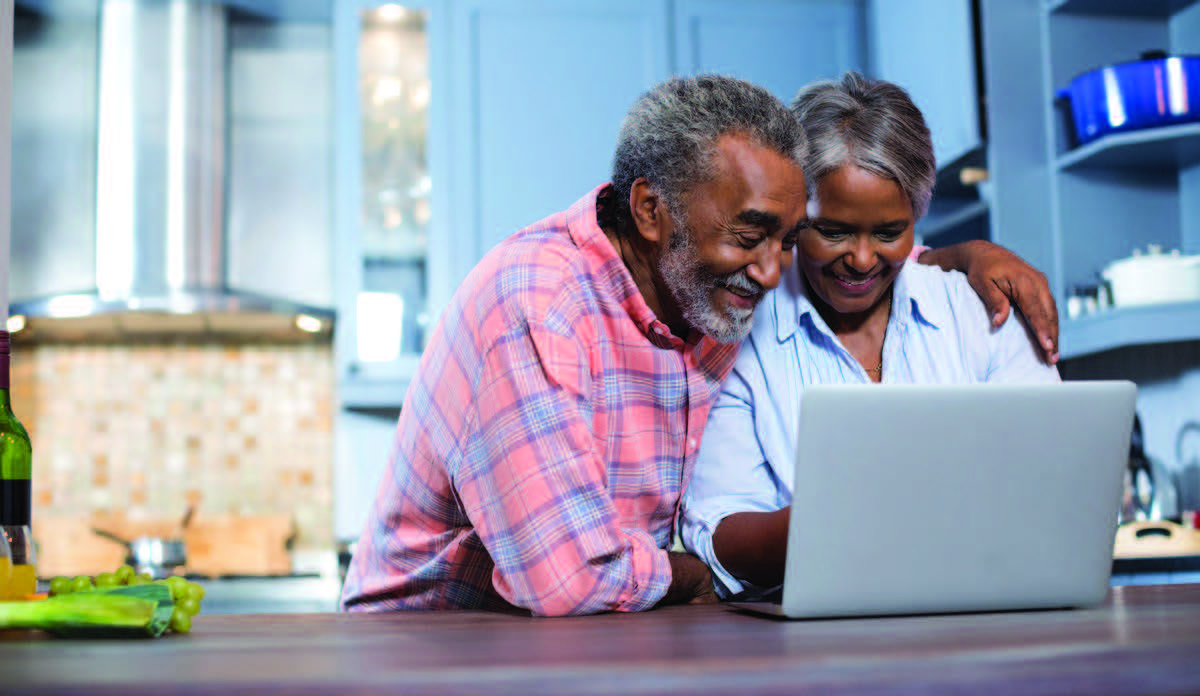Aging is a fact of life but there are many ways to stay active, healthy, productive, and happy. And if your parents are already seniors, in good health, and living independently—you may not feel any dramatic changes or concerns. It’s good to plan ahead while everyone can fully participate in decision-making for the future!
Did you know that approximately 45 million Americans are age 65 or older? And by 2030, it is predicted that 73 million Americans will be age 65 or older.
By 2034, the U.S. population will be comprised of more older adults than children.
APPROACHING RETIREMENT
For some, retirement is a time of relaxation and freedom. Others fall victim to boredom or feeling without purpose. You may want to play golf all day or you may want to get another job. But as you prepare for this stage, here are a few things to keep in mind:
• Take advantage of the benefits of retirement planning, financial planning, and estate planning.
• Review the financial implications of a planned retirement date.
• Review the financial implications to determine your best age to begin collecting Social Security.
• Learn the deadlines and associated penalties for signing up for Medicare.
• Be aware of the differences between Original Medicare and Medicare Advantage Plans. This can affect what services are covered, what co-pays are due, and coverage restrictions, etc.
• Contribute the maximum possible to retirement plans.
• Consider Life Insurance and Long-term Care Insurance policies. Note that some Life Insurance policies make accelerated death benefit payments to help pay for longterm care.
• Develop a plan for how you intend to spend your time.
• Create a budget for living and recreational expenses.
In a recent survey, 59% of older Americans said they plan to delay retirement.
KEEP THE MIND AND BODY MOVING
It’s important for seniors to stay active after retirement.
For the mind.
Stay connected socially as much as possible. Take continuing education classes. Volunteer. Play card or puzzle games. Read. Garden. Learn new things. Take a dance class. Try a new hobby. Get another job. Join clubs or online groups of people with similar interests. Just keep doing what you love!
For the body.
Make maintaining health a priority. Eat nutritiously.Get regular sleep. Have regular doctor visits, annual bloodwork done, and eyes and hearing checked. For minor health issues, take advantage of telehealth services where you can speak to a doctor or nurse online. Exercise. Seniors that exercise regularly are more likely to be able to maintain their independence. Regular exercise helps older adults have the ability to walk, bathe, cook, eat, dress, and use the restroom. Research has shown that it’s important for seniors to do exercises for endurance, strength, balance, and flexibility. Some recommended exercises include:
• Walking
• Water aerobics
• Strength training with
dumbbells
• Resistance band
• Workouts using body weight
• Pilates
• Chair exercises or chair yoga
And being able to maintain balance is critical. Every year, 1 out of 3 older adults fall, yet less than half tell their doctor. Every 20 minutes, someone in the U.S. dies from a fall. Besides those deaths, falls can cause knee or other injuries, or severe injuries like hip fractures or brain injuries that leave a person bedridden. And that can spiral into problems like depression or pneumonia.
To test your balance, stand on each leg for at least 10 seconds.
ADDRESS MOBILITY CHANGES
At some point, the mobility situation of a person may change, but there are mobility aids that can help, like:
• Cane
• Walker
• Wheelchair
• Shower benches
• Swivel seat cushions
• Risers for chairs, sofas, or toilet seats
Some of these aids may be purchased over the counter or used, but out-of-pocket costs may be incurred and equipment fit matters! The wrong sized equipment can lessen a senior’s stability and even cause pain. The best route is to start with a doctor visit, who can refer the senior to a physical or occupational therapist or medical equipment supplier. The suppliers have experts to size the equipment properly and provide training on proper use. Plus, equipment costs may be covered by insurance when prescribed.
For seniors to live at home comfortably and safely, some of the following home modifications may be considered:
• Installing ramps or railings where needed and bars in the shower
• Installing walk-in showers or tubs
• Making clear pathways by moving/removing clutter or furniture or securing area rugs
• Placing often used items in easy to reach locations
Also, seniors may benefit from having certain items handy, like pill boxes, jar openers, flashlights, magnifying glasses, and medical alert devices, etc. Save all receipts from equipment or home modifications for possible reimbursement or tax purposes.
ARRANGE FOR TRANSPORTATION
Driving helps older adults stay mobile and independent. Older adults generally practice safe driving behaviors like wearing seat belts, driving when conditions are safest, and not drinking and driving. But the risk of being injured or killed in a traffic crash increases as people age, due to declines in vision, cognitive functioning, or physical changes. According to USAging, about 600,000 older adults stop driving each year. This can negatively affect their health and well-being because they become unable to independently go shopping, to doctors appointments, to social events, and more. Family members and caregivers often provide transportation, but professional services, non-profit organizations, and non-emergency medical transportation are some other options available. A good place to start for free services is a local council on aging. Gogograndparent.com is an example of a business to look into. There are costs and fees, but they can transport seniors without needing to use a cell phone or app, and they notify family members of their location.
WHEN EXTRA CARE IS NEEDED
There may come a time when yourself or loved one needs some extra help. Nearly 70% of adults 50+ believe that they will need assistance with their daily activities as they get older, yet fewer than 30% have given serious thought to how they will continue to live independently if they need such assistance.. Other sources of help include technological devices that can provide assistance or even various community services geared at helping seniors. The first step is to see where an individual needs support and then assess all the possible solutions. It is vital to check what costs are and are not covered by the individual’s selected Medicare plan or other insurance policies. Activities of daily living (ADL) are the essentials necessary to the physical and emotional well-being of seniors and will help ensure their daily living requirements are met effectively:
• Self-feeding
• Personal Hygiene
• Bathing or Showering
• Toilet Hygiene
• Dressing
• Functional Mobility
Other types of daily living activities related to independent functioning are called instrumental activities of daily living (IADLs) and typically refer to the following types of activities with long-term care:
• Taking Prescribed Medications
• Managing Money and Paying Bills
• Cooking and Preparing Meals
• Cleaning and Maintaining the Home
• Shopping and Buying Necessities
• Running Errands
• Speaking or Communicating on the Phone or Through Other Devices
Caregiving may be provided by a spouse, adult children, friends, neighbors, or professional caregivers.
LIVING OPTIONS
Below are the most common types of living arrangements available to seniors:
Living at Home. Most seniors want to live independently in their own home. This requires being able to manage home maintenance, houseclean-ing, yard work, housework, meal preparation, taking medications, or paying bills, among other things. Caregiver support from friends, family, or professionals may also be needed. Some people choose to downsize to a smaller home or apartment to lessen the load. A home can also be modified to help a senior live their comfortably and safely.
Living with A Relative/Family. Seniors who need assistance with daily activities and some health care support (non-skilled) while having the companionship and care provided by living with a family member(s). Independent Living Communities. Active, independent seniors may like to rent or buy a home/apartment in a community with other seniors. Many of these communities offer gyms, clubhouse, yard maintenance, housekeeping, security, transportation, laundry service, group meals, or social activities.
Assisted Living Communities. Seniors who are still relatively independent but may need some assistance and caregiving with their daily activities such as meals, dressing, bathing, help with medication and transportation may like an assisted living community. These communities may offer rooms or apartment rental, group meals, social activities, exercise, laundry services, or housekeeping.
Nursing Homes. Seniors who require a living environment with medical surveillance and caregiving but don’t need a hospital or have checked out of a hospital may need this type of environment, typically for chronic conditions or short-term rehabilitative care. Nursing staff is on-duty 24 hours a day. Roughly half of the adults 50-plus in a recent AARP survey believe that Medicare covers care in a nursing home or care in their own home from a home health aide but it generally does not.
Palliative and Hospice Care Services. Certain organizations are dedicated to supporting people dealing with terminal illness.
Palliative and hospice care offer distinctly different services, but both encompass a philosophy that aims to make patients as comfortable as possible.
Palliative care, or supportive care, addresses symptoms and side effects of serious illnesses, but most often cancer. Typically, palliative care is provided as an additional layer of support as a person goes through curative treatments, often addressing the emotional and psychological aspects of illness for the patient and their family. This type of care provides comfort and re-duces pain. People receiving it can still try to cure their condition, such as through chemotherapy or surgery.
Hospice care only takes place after a person stops seeking curative treatments. Hospice care does not necessarily mean imminent death as some people assume, but it’s a way to embrace life and get much-needed support for patients and families. The goal is to provide comfort for the individual when doctors no longer deem recovery likely and are seeking quality of life over quantity of life.
Both types of care can take place at the individual’s home, a retirement community, a nursing home, or in a hospital. Some hospice and palliative care organizations offer inpatient units for when patients need additional support.
FOR CAREGIVERS
Caregiving for a parent or spouse can be difficult both physically and emotionally. There are many decisions to be made about transportation, recreational activities, personal safety, meals, medical care, finances, and more. Caregivers are often required to help with ADLs. And it can be hard for an individual to handle the overall decline in physical and mental vitality, standard of life, and emotional well-being of a close loved one. The goal is to keep their best emotional, mental, and physical well-being at heart. Balancing caregiving with work and other family obligations can be stressful, and the most difficult part is often the demand on their time. Stress can negatively affect your health, well-being and ability to provide care. Tend to your own needs for exercise, sleep and healthy eating and take advantage of respite care services or offers from friends. Find ways to reduce your stress and make sure to take time to have fun! If you take the time to care for your-self, you often return to your responsibilities renewed and better able to provide care for your loved one. Caregiver support is available. In addition to siblings and other family members, there are experts, professionals, re-sources, and other information to help you in caring for If a caregiver needs to take a leave of absence from their job to care for a loved one, they may be entitled to up to 12 weeks of unpaid leave under the federal Family and Medical Leave Act, depending on their employer employment status.
ADDRESS LEGAL ISSUES
It’s a good idea to have legal documents prepared before they are needed. This allows the person to receive the medical care they want, avoid unnecessary suffering by loved ones, and relieve caregivers of the burden, confusion or any disagreements when making decision during moments of crisis or grief. Seniors should talk to family members and other important people in their life about their wishes. Recommended documents:
• Will – a legal document that spells out how you want your affairs handled and assets distributed after you die.
• Trust – a fiduciary arrangement whereby a grantor/trustor gives a trustee the right to hold and manage assets for the benefit of a specific purpose or person.
• Power of Attorney for health care – legal document determining who will make health care decisions if an individual is unable to do so.
• Power of Attorney for finances – legal document determining who will make financial decisions if an individual is unable to do so.
• Living Will – a written, legal document that spells out medical treatments you would and would not want to be used to keep you alive, as well as your preferences for other medical decisions, such as pain management or organ donation.
• Advance directives – guides the choices that will be made by family, caregivers, or doctors if a person is terminally ill, seriously injured, in a coma, in the late stages of dementia or near the end of life.
• Do not resuscitate (DNR) and do not intubate (DNI) orders – these are not required to be written legal documents but should be conveyed to the doctor and family.
There are attorneys who specialize in issues that affect seniors like estate planning, wills and trusts, long-term living situations, preserving and protecting assets, appeals to Social Security and Medicare, and addressing abuse and fraud, and more. Important Documents. Locate and keep valuable documents in a safe place where they can be easily accessed by a Power of Attorney or trusted individual:
• Power(s) of attorney for financial and health
• Will and/or trust
• Medicare card
• Insurance cards
• Social Security card
• Insurance policies/cards
• Pension benefits
• Death Certificate of a spouse or parent
• Birth Certificate
• List of bank accounts and safety deposit boxes
• List of retirement accounts
• Military discharge papers
• Marriage certificate
• Divorce decree
• Citizenship papers
• Deeds to property
• Deeds to cemetery plots
WATCH OUT FOR SCAMMERS!
57% of U.S. adults age 45 and older are concerned about becoming a target or victim of a scam. Most are vigilant about protecting themselves.
• Don’t ever give out your account numbers, banking information, Social Security number, address, or personal information if asked via phone, text, or email, unless you have initiated the conversation and you know to whom you are speaking. Scammers can have a caller ID that matches the official number of an organization, and they can imitate voices well. If you ask for their number to call them back, they will usually give up and hang up.
• Be aware of phone scams regarding Medicare or offering free medical equipment. If a caller ever asks you to verify your Medicare ID number, do not give it to them. Medicare never makes unsolicited calls or visits to your home, so never entertain someone pressuring you to accept anything that’s “free.”
• Don’t open suspicious texts or emails or click on links from people you know, companies you do business with, or strangers. Sometimes accounts, such as Facebook or Twitter, can be hacked, and the person or company contacting you is not who they say they are. If ever in doubt about a message you receive, always reach out to the person or company to verify they have contacted you.
• Beware of emails or texts alerting you that one of your accounts
(Netflix, PayPal, utilities, bank, etc.) has been suspended or canceled or you need to change your password. Scammers can fake an email address and logo. Contact the business in question through the official means listed on your account.
• Don’t fall for the phone scam that tells you one of your loved ones or grandchildren is in trouble or in jail and needs money, or worse, pretends to be that person. Ensure your loved ones are safe by contacting them directly, and never give personal information or money to unknown numbers or people.
• If you “meet” someone online or on dating apps, always meet them in a public place for your first in-person meeting. Never give out your financial or personal information other than your name.
• Beware of scammers who will feign romantic interest in you and slowly gain your trust if you are single, divorced, or widowed. They will typically get to know you and then begin to fabricate requests for money as time goes on. For example, they may ask you to help cover medical expenses or say they need money for food, clothing, etc.
• Apps like Venmo or CashApp allow you to easily transfer money to others and request money too. Do not fall for the trap that someone has “accidentally” transferred money to you. The scammer uses a stolen credit card to “transfer” the money, and you will be sending your own money back. Contact the app’s support team and block the person’s account.
BY ELIZABETH DEAL, ADAM BAILEY, ISABELLE ROGERS















